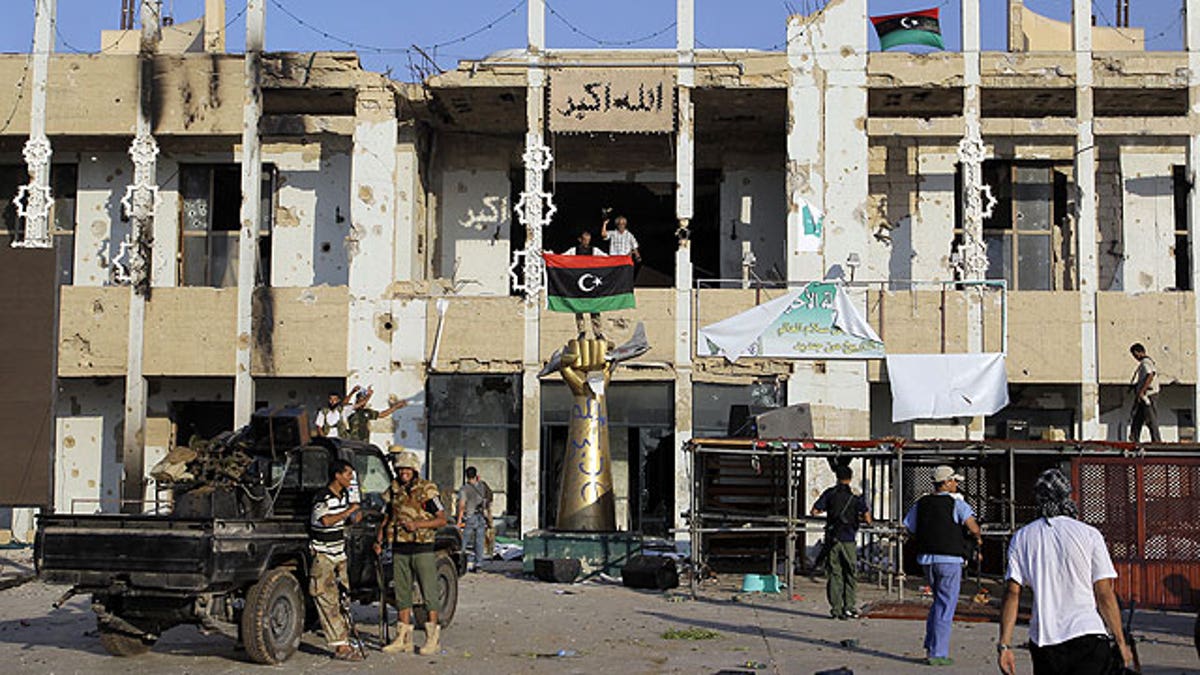
August 23: Rebel fighters seen inside the main Muammar Qaddafi compound in Bab al-Aziziya in Tripoli, Libya. (AP)
TRIPOLI, Libya – Rebels hunting the top officials in Muammar Qaddafi's ousted regime have captured his foreign minister and are closing in on Qaddafi himself, rebel officials said Thursday.
The announcement, made on the 42nd anniversary of the coup that brought Qaddafi to power, also came as rebels forces pressed toward three major bastions of the crumbling regime, including Qaddafi's hometown.
"The regime is dying," rebel council spokesman Abdel-Hafiz Ghoga said late Wednesday, after two of Qaddafi's sons made conflicting statements on Arab television stations -- with one vowing to fight until death and the other offering to negotiate a truce. "Qaddafi's family is trying to find an exit," Ghoga said. "They only have to surrender completely to the rebels and we will offer them a fair trial. We won't hold negotiations with them over anything."
Ghoga said Thursday that the rebels had extended the deadline for the surrender of Qaddafi's hometown of Sirte -- originally set for Saturday -- giving the loyalist forces there one more week.
"There are good indications that things are moving in the right direction," he said, including that the rebels have captured a city near Sirte.
Algeria offered safe haven to Qaddafi's wife and three of his children Monday, angering the Libyan rebels. The Algerian newspaper El Watan reported that Qaddafi himself also sought refuge, but the Algerian president refused to take his phone calls.
With Qaddafi's whereabouts unknown, Algeria's foreign minister insisted Thursday that he's not in Algeria. Asked on Europe-1 radio if Qaddafi could be given asylum, Mourad Medelci said, "I don't believe so."
Thursday marks the coup against the monarchy of King Idris by 27-year-old Qaddafi and a group of military officers. Qaddafi took undisputed power and became a symbol of anti-Western defiance in a Third World recently liberated from its European colonial rulers. A brutal dictator, his regime was unchallenged until the uprising that began in February.
Ahmed Said, an adviser to the interior minister in the rebels' interim government, did not identify the captured foreign minister by name, but "can confirm that he is in custody."
A week ago, Foreign Minister Abdul Ati al-Obeidi told British broadcaster Channel 4 that Qaddafi's rule was over.
After six months of civil war, rebels have seized control of most of Libya, including the capital Tripoli, effectively ending Qaddafi's rule. The longtime leader and his family have not been captured, but rebels say they are hot on Qaddafi's trail.
Rebels say they are carefully pulling together clues about Qaddafi's whereabouts from captured regime fighters and others, and learned earlier this week that Qaddafi and two of his sons -- longtime heir-apparent Seif al-Islam and former special forces commander al-Saadi -- were in the loyalist-controlled town of Bani Walid, said Ghoga. But, he added, it's not clear where they are now.
Late Wednesday, men claiming to be Seif al-Islam and al-Saadi made their appeals from hiding.
Seif al-Islam urged his father's supporters to fight the rebels "day and night." He told the Syrian-based Al-Rai TV station that residents of Bani Walid agreed that "we are going to die on our land." Seif al-Islam was once considered the moderate face of the Qaddafi regime and the leader's heir apparent.
He said NATO had carried out several deadly airstrikes in Bani Walid.
"Attack the rats," he said, referring to the rebels, adding that he was calling from a suburb of Tripoli and that his father "is fine."
In a separate phone call to Al-Arabiya television, a man identifying himself as al-Saadi said he was ready to negotiate with the rebels to stop the bloodshed. Rebel leaders have repeatedly said they won't negotiate.
But Al-Saadi said he spoke for his father and regime military commanders in calling for talks, saying the rebels could lead Libya.
"We don't mind. We are all Libyans," he said. "We have no problem to give them power."
The voice of Seif al-Islam -- who was reportedly captured by the rebels earlier this month only to turn up free and defiant in Tripoli -- was easily recognizable. Al-Saadi's voice is less familiar and more difficult to confirm.
Rebel forces have been advancing toward three regime strongholds: Qaddafi's hometown of Sirte; the town of Bani Walid, 90 miles southeast of Tripoli; and Sabha, in the southern desert. All three places had been given a deadline of Saturday to surrender. While the deadline extension was officially only for Sirte, rebels said it would also include Bani Walid and Sabha.
There has been speculation that Qaddafi is hiding in one of those three towns.
A NATO statement said their forces had launched airstrikes Wednesday against Sirte, and near Bani Walid and Hun, a town midway between Sirte and Sabha. Their targets included missile launchers, an ammunition storage site and a tank.
Rebels at checkpoints leading toward Bani Walid said Thursday they had been ordered to remain in their positions until Saturday.
Qaddafi's eight adult children have played influential roles in Libya, from commanding an elite military unit to controlling the oil sector. Al-Saadi, 38, headed the Libyan Football Federation, and at one point played in Italy's professional league but spent most of his time on the bench. He also had run-ins with police in Europe.
Qaddafi's wife, Safiya, sons Mohammed and Hannibal, and daughter Aisha fled to Algeria on Monday. Aisha gave birth to her fourth child Tuesday in Algeria.
Sixty world leaders and top-level envoys are meeting Thursday in Paris on Libya's future. The gathering is likely to focus on unfreezing billions in Libyan funds held abroad and reconciling differences over how to deal with the new Libya. The lessons of the U.S.-led war in Iraq and years of insurgent violence there will loom large.
